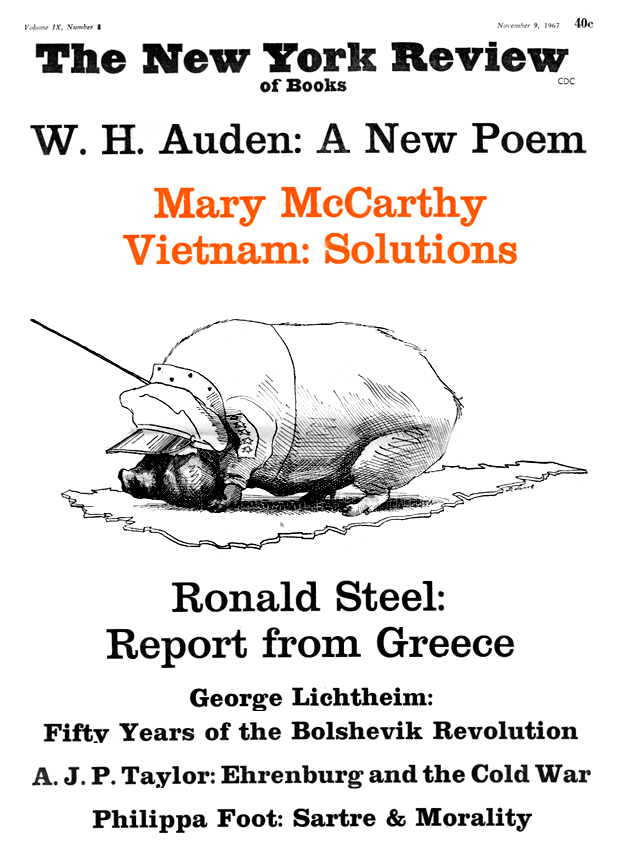In response to:
Good Man from the August 3, 1967 issue
To the Editors:
I do not usually comment on reviews of my books, but I am surprised at the mention of Five Years in The New York Review of Books [August 3]. Your reviewer says, “he thought to publish something that would make it clear he indulged in homosexual activity” and this is what the book is about. I do, but the items on sexuality of any kind in Five Years are about one-seventh of the total, and half of those are sociological in nature. Like other thought-diaries in the manner of Amiel or Pascal, or Valéry, the main concern of Five Years is with method, in science, art, and theology; it is apparently this that occupies the mind of people like us when we are alone and not busy about something. I wish John Thompson would explain himself.
Paul Goodman
N. Stratford, N.H.
John Thompson replies:
Well, I am surprised too, to find Paul Goodman saying that sex is only one-seventh as important as everything else. I’d have supposed he might agree that sexual behavior is likely to be the most dramatic of all our expressions of our basic character and interests. So I took it to be the thing most worth remarking in his Five Years—as did Harold Rosenberg in his Introduction to the book. This Introduction I ought in fairness to have mentioned, because Rosenberg thinks the book one of Paul Goodman’s “finest creations,” as I do not. I thought the sex was mean and boring, but again, in fairness I might have made it clear that this only represented and did not really present what was in the rest of the book. Since the book is based on journals, it is especially personal and in large part self-regarding. As Rosenberg says, speaking of the various headings, some of which are People, places, things; Psychology; Society; Language; Method; Art; God; In a hospital; South; Myself; Growing up; Around the country: “How many of the notes belong under any but ‘Myself’?” Thus, because the book is so personal, the reactions of readers are likely to be personal too, and may vary a good deal. I might have tried, in fairness, to give a clearer idea of the rest of the contents, so readers could gather some notion of whether or not this kind of material might interest them, even though it did not interest the reviewer. But I must admit my view of it is so dim that even to quote from it seems unfair. There is no really typical paragraph in this series of reflections. Some of them are more personal than the following one, some are less. I take this to be a fair sample, but perhaps it is not. It is under the heading “Society.”
My social existence is absurd. In God’s creation I’m a kind of juvenile delinquent, a little Manfred. But I move in a society so devoid of ordinary reality that I am continually stopping to teach good sense, to give support, to help out, as a young gangster might help an old lady across the street on his way to the stick-up. So I cut quite a respectable figure, though on the pious and boring side. All this does nothing for me except to confuse me and use up my time. When the Devil quotes Scriptures, it’s not, really, to deceive, but simply that the masses are so ignorant of theology that somebody has to teach them the elementary texts before he can seduce them. When long ago I threw in my lot with Cain and Ishmael because they were able to get to talk to God, I little realized that I was dooming myself to become a pillar of humane culture.
When Paul Goodman addresses himself to public problems, as he does in Like a Conquered Province, he is superb. In his off hours, reflecting on himself, he seems to me no better than the rest of us vain creatures. Anyway, Five Years: Thoughts During a Useless Time, is published by Brussel & Brussel, 80 Fifth Avenue, New York, and costs $5.00.
This Issue
November 9, 1967


